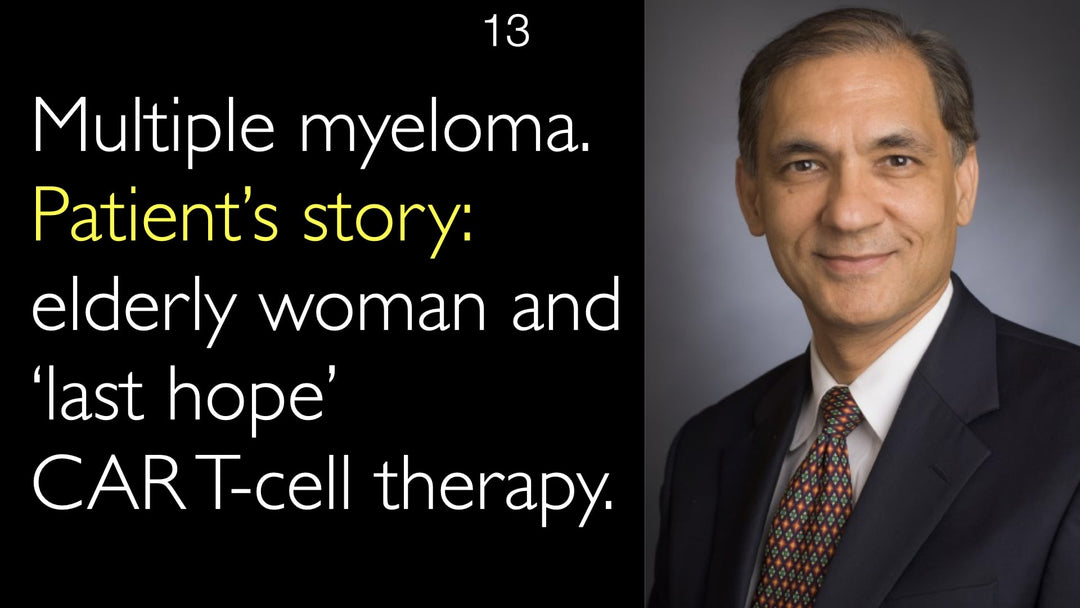Leading expert in colorectal cancer, Dr. Hans-Joachim Schmoll, MD, explains how precision medicine and molecular tumor profiling are reshaping colon cancer prognosis. He details the shift from traditional staging to a classification that includes tumor location, patient sex, and specific mutations like KRAS and BRAF. Dr. Schmoll, MD, describes a pioneering adaptive clinical trial design that efficiently tests multiple new first-line chemotherapy combinations against a standard maintenance regimen.
Precision Medicine and Prognosis in Colorectal Cancer Treatment
Jump To Section
- Factors Influencing Colon Cancer Prognosis
- Molecular Classification Beyond TNM Staging
- Targeted Therapy Based on Tumor Mutations
- Innovative Adaptive Clinical Trial Design
- Maintenance Therapy After Induction Chemotherapy
- Future of Personalized Colon Cancer Care
- Full Transcript
Factors Influencing Colon Cancer Prognosis
Colon cancer prognosis is influenced by a complex combination of factors. Dr. Hans-Joachim Schmoll, MD, emphasizes that colorectal cancer is not a single disease but a collection of many different molecular entities. These factors originate from both the tumor's biology and the patient's own body.
Traditional anatomical staging and tumor location provide a foundational prognosis. However, a modern understanding requires integrating these with molecular data for a complete picture.
Molecular Classification Beyond TNM Staging
A new classification system for colon cancer moves beyond simple TNM staging. This system incorporates molecular expression types, the clinical stage of the disease, and the primary tumor's location. It also considers the patient's sex, as this can influence treatment response and outcomes.
Dr. Hans-Joachim Schmoll, MD, explains that this holistic view is crucial for personalized therapy selection. Relying solely on anatomical stage can obscure critical differences at the molecular level that directly impact a patient's journey.
Targeted Therapy Based on Tumor Mutations
Identifying specific tumor mutations is a cornerstone of precision medicine in colorectal cancer. Mutations in genes like KRAS and BRAF have a profound effect on both treatment options and overall prognosis. These biomarkers are relevant at every stage of the disease, from early to advanced.
Dr. Anton Titov, MD, and Dr. Schmoll discuss how these mutations guide therapeutic decisions. This approach ensures patients receive treatments most likely to be effective for their specific cancer subtype.
Innovative Adaptive Clinical Trial Design
Dr. Hans-Joachim Schmoll, MD, describes a modern adaptive clinical trial design for testing new colon cancer medications. This innovative model uses Bayesian analysis to evaluate multiple experimental chemotherapy combinations simultaneously within one large trial. The design is adaptive, meaning an arm of the trial can be closed while the study continues to test new combinations.
This method provides robust, comparative data on different medications under identical conditions. It is a highly efficient way to accelerate the discovery of new first-line treatment options for newly diagnosed patients.
Maintenance Therapy After Induction Chemotherapy
A key strategy in modern colon cancer care is the use of maintenance therapy. Patients first receive a standard three-month course of induction chemotherapy. For the majority of patients, this initial treatment is effective.
The subsequent maintenance phase aims to sustain the response achieved by induction. A common standard maintenance regimen combines 5-fluorouracil and Bevacizumab. In adaptive trials, this standard is compared against various novel experimental drug combinations to find more effective long-term strategies.
Future of Personalized Colon Cancer Care
The future of colon cancer treatment lies in an increasingly detailed molecular understanding. Dr. Hans-Joachim Schmoll, MD, anticipates that knowledge of many cancer stages and types will continue to expand. This will enable oncologists to know exactly how to treat each individual patient with greater precision.
Dr. Anton Titov, MD, highlights that current progress is built on data from prospective clinical trials. The ongoing research and adaptive trial designs are paving the way for a new era of truly personalized and effective colon cancer care.
Full Transcript
Dr. Anton Titov, MD: How to predict survival for each colorectal cancer patient? How can precision medicine treatment of colorectal cancer influence prognosis? How to adapt targeted colon cancer chemotherapy to every patient?
A leading colorectal cancer oncologist and research expert discusses colon cancer prognosis and treatment options.
Much is written about prognosis in stage 2, stage 3, and stage 4 colorectal cancer. But we learn that colon cancer is not just one entity; it is perhaps a dozen or so different diseases labeled "colorectal cancer."
Colon cancer prognosis by stage or by TNM classification perhaps obscures differences at the molecular level of colon cancer tumors. Let's reformulate the prognosis question: what are the important factors that influence the prognosis in a particular colon cancer patient?
These factors come from the colon cancer tumor; they also reflect the body of the patient. We cannot answer this question in a few sentences.
Dr. Hans-Joachim Schmoll, MD: A new colon cancer classification takes into account molecular expression types of colon cancer. It also includes the clinical stage, location of the tumor, and sex of the patient.
Classification of colon cancer is also important for personalized therapy selection for chemotherapy treatment. We have to identify specific tumor mutations; for example, KRAS or BRAF mutation in colon cancer tumors affects treatment and prognosis at every stage.
We have two problems in colon cancer prognosis prediction: one is anatomical location of the tumor and gross pathological stage of tumor invasion. The other factor that affects prognosis is molecular mutations in the colon cancer tumor itself.
With time, we will come to a more detailed understanding of many stages and types of colon cancer tumors. We will know how exactly to treat each patient.
But at the moment, we are relatively limited by the data coming from prospective clinical trials.
Dr. Anton Titov, MD: However, we know several important factors in colon cancer prognosis.
Dr. Hans-Joachim Schmoll, MD: There was a clinical trial that I organized in Germany. It was done in collaboration with Roche. I can say about the company without conflict of interest because similar international trials were done in the UK.
Also, clinical trials in Toronto, Canada, and other countries have led to similar conclusions about prognostic factors in colorectal cancer. The aim of this clinical trial was to find new targeted colon cancer chemotherapy medications.
The goal was to identify new early, first-line colon cancer therapy—not at advanced fourth and fifth-line chemotherapy of colorectal cancer, but at the beginning of the treatment.
Searching for new first-line treatment options is difficult because we already have effective chemotherapy for newly diagnosed colon cancer patients.
What we do is this: we give three months of standard chemotherapy. It is effective for the majority of these patients, at least from the beginning.
Then we have the phase we call the maintenance phase. We aim to maintain the effect of the first induction chemotherapy. We give 5-fluorouracil and Bevacizumab as maintenance chemotherapy.
Dr. Anton Titov, MD: Colon cancer patients can be treated with this combination for a long time.
Dr. Hans-Joachim Schmoll, MD: We compare this standard maintenance chemotherapy with a combination of different experimental colon cancer medications. We use different experimental colon cancer medication combinations.
Sometimes one arm of a clinical trial is finished; we do not stop the clinical trial. We next try a different chemotherapy combination. This is called adaptive clinical trial design.
This is a more modern design of clinical trials. It has Bayesian analysis of chemotherapy in colon cancer. This enables us to have one big clinical trial.
We put all chemotherapy combinations into the same patients. We test medications at the same time and under the same diseases. We have good information about the value of these different colon cancer medications.
Dr. Anton Titov, MD: This is the first major adaptive clinical trial for patients who start induction colon cancer chemotherapy.







